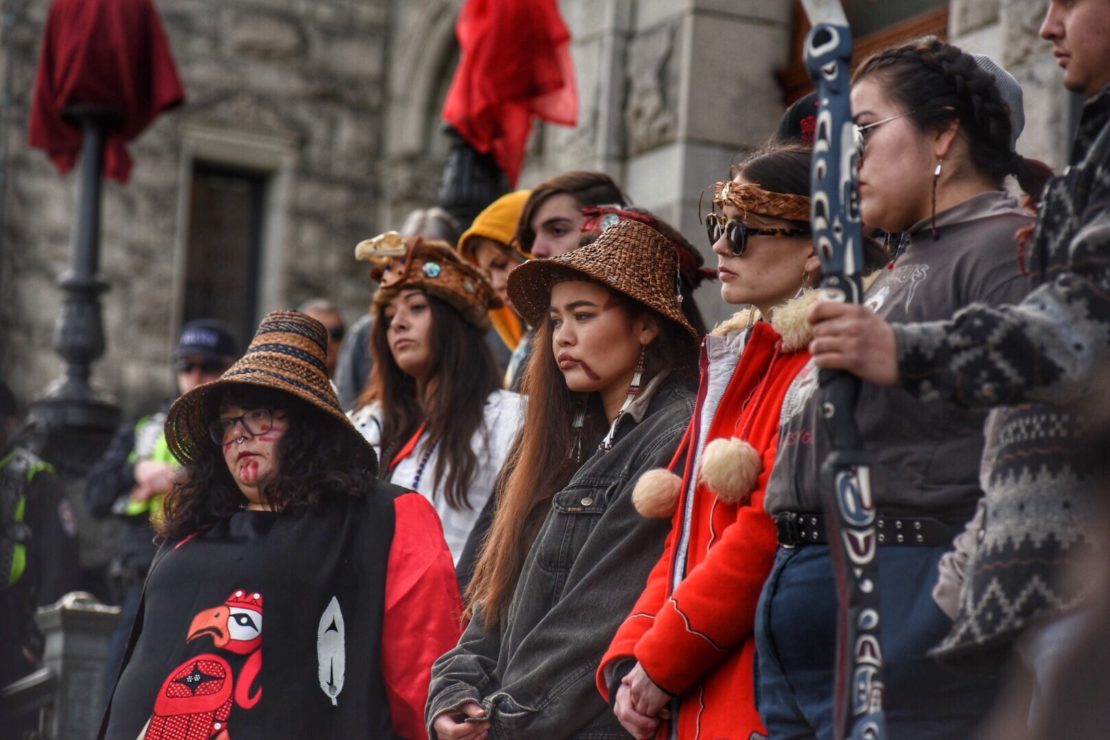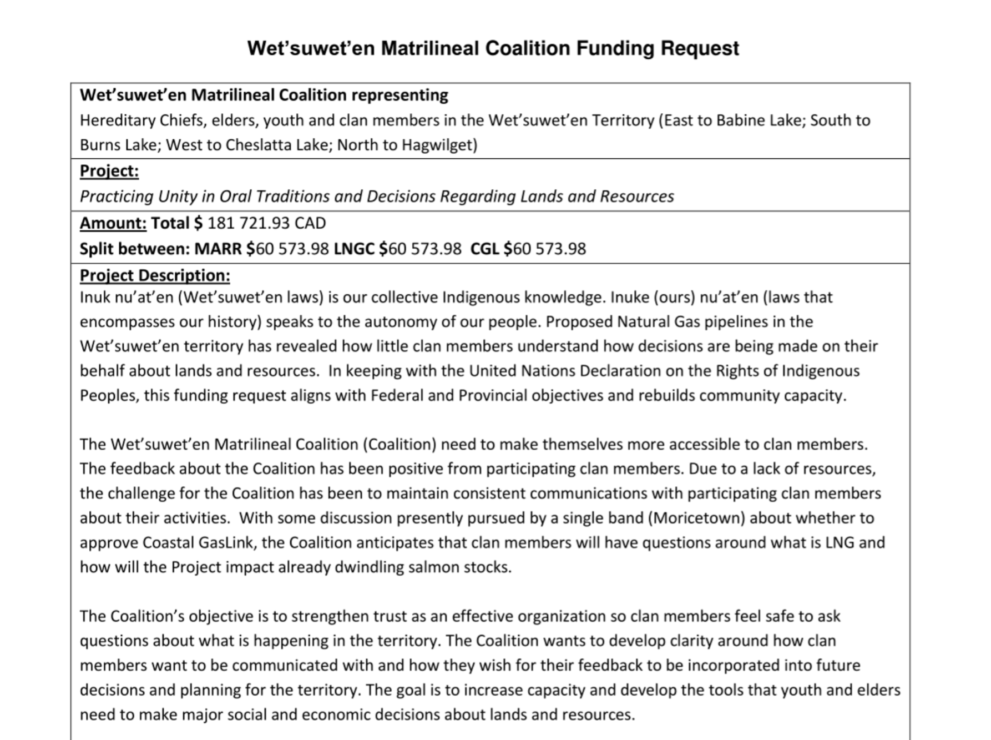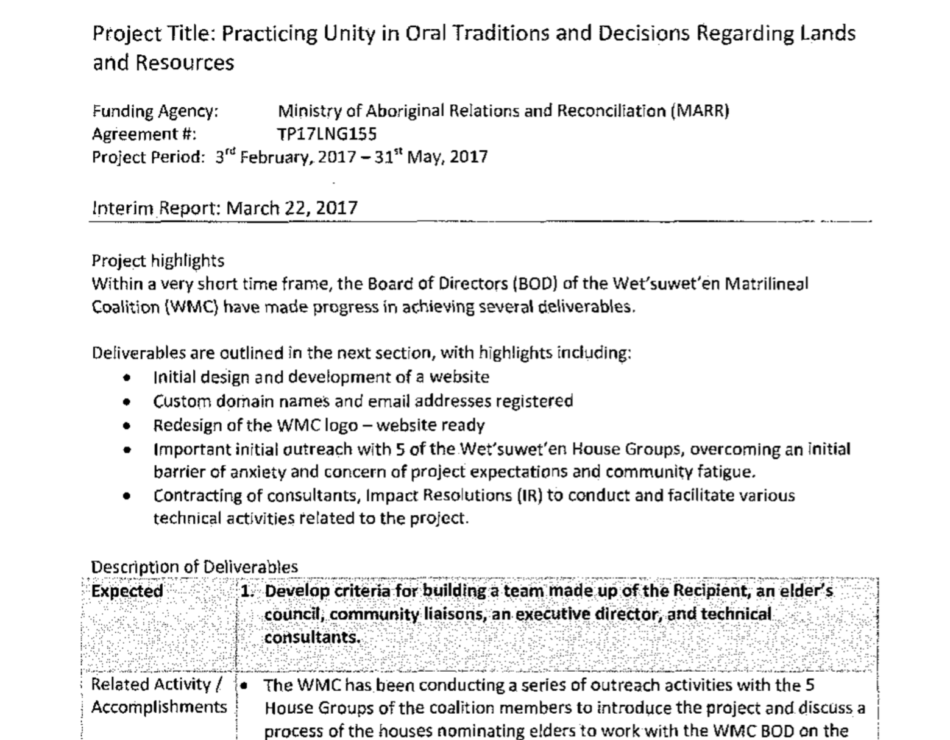Documents show effort to sway public opinion, create new decision making structure through workshops

While the hereditary chiefs were actively discussing a proposed deal with the government on land title, Teresa Tait-day, the co-founder of the Wet’suwet’en Matrilineal Coalition (WMC, also known as Wet’suwet’en Matriarchal Coalition), spoke at the Standing Committee on Indigenous and Northern Affairs in Ottawa.
“As female Wet’suwet’en members and community leaders, we want to be heard,” Tait-day said. “Many of the male hereditary chiefs are acting out of internalized historical oppression. We face patriarchal domination.”
Tait-day has been vocal in her opposition of the chief’s decisions. In her recent speech in Ottawa, for instance, she alleged she was being bullied by the hereditary chiefs and left out of decision making processes with the province. She also said people acting in solidarity with the chiefs throughout Canada were “hijacking” her nation.
She was invited to speak by a federal party. When CBC journalist Chantelle Bell Richard asked why Tait-Day was invited, they said “the committee members decided by consensus that each party would suggest one ‘Indigenous expert’ to speak to the complex underlying issues related to the study.”
Since speaking to the committee, Tait-Day has been featured in CBC, National Post, and APTN articles.
The WMC is not, and was not ever, an independent Indigenous body or governance structure but rather a group founded with the B.C. government and CGL to sway Wet’suwet’en public opinion in favour of the pipeline, according to documents obtained in a 2017 F.O.I..
In 2015, the WMC was incorporated as a corporation, without consultation of the Wet’suwet’en hereditary chiefs. Documents obtained from the B.C. government show the WMC was a joint project between Coastal GasLink (CGL), the Ministry of Indigenous Affairs and Reconciliation, and the three founding members — Gloria George, Darlene Glaim, and Tait-Day.
In a resignation letter from Glaim, she says the group was “formed with the intent to negotiate a benefit agreement for Clan/House members with [CGL],” and that in 2017 the hereditary chiefs explicitly called the WMC a strategy used by the government and CGL to disunite their people.
“We had a meeting with about 50 people,” Tait-day explains in a video for Resource Works. “And they said find a way to get this agreement done. As a result of that, we formulated the [WMC] .. .and we started to negotiate with [CGL].”
WMC originally requested $181 721 in funding from LNG Canada, CGL, and the province. The B.C. government and CGL each donated $60 000 to WMC to carry out workshops, which aimed to educate the Wet’suwet’en about the economic benefits of LNG.
Since WMC was founded and began holding their workshops, there has been contention about their ability to hold any authority as they inherently attempt to undermine the Wet’suwet’en governance structure.
Documents show that the purpose of the WMC was not only to advance LNG, but also to delegitimize the hereditary chiefs by brainstorming new “decision-making” processes in relation to resource projects.
The stated purpose of the organization includes an agreement between the government and WMC, stating their goal to bring Wet’suwet’en people together to “discuss decision-making processes for economic development opportunities, specifically natural gas development as that was identified as a gap in the decision-making process.”
It further hopes to “bring Wet’suwet’en members back into the information sharing and decision making processes based on the traditional practices but in a modern day context.”

The WMC claims this pipeline is approved by 85 per cent of Wet’suwet’en people, but there is no further evidence of how they arrived at this figure. Because she caused so much contention between the clans, Tait-day is banned from attending traditional Wet’suwet’en feast halls.
Tait-day is not a hereditary chief but previously held the family name of a hereditary chief. She was stripped of her hereditary title in a feast hall.
Despite having no jurisdiction in the traditional governance model, Tait-Day has been cited in the Globe and Mail with her vocal opposition to the pipeline.
Micheal Lee Ross, the lawyer representing Unist’ot’en to the B.C. Supreme Court, explained in court that “WMC includes individuals who have improperly represented themselves as hereditary chiefs and who in consequence have been reprimanded and ordered to stop using a hereditary chiefly title or formally stripped of the claimed chiefly title.”
The WMC hired a private firm called Impact Resolutions to assist them with creating websites, social media, and making their workshops effective. In their funding requests, it’s clear a lot of their funding goes towards this firm.

In June 2016, the hereditary chiefs interrupted a meeting between the WMC and TransCanada. Once the representative from the Ministry, Katie Scott, and representatives from TransCanada heard the hereditary chiefs were on their way, they quickly left.
In a Youtube video from the meeting, the chiefs are shown in their full regalia speaking to a crowd of about 60 men and women. They repeatedly spoke of this meeting as an effort by the government and TC, not the Wet’suwet’en, to create division and invited everyone to a traditional feast hall, including the government and TransCanada representatives that had already left, to resolve things.
“[The WMC] is not sanctioned by the chiefs,” Kloum Khun, a hereditary chief of the Laksamshu clan said.
The slide on the meeting’s interrupted PowerPoint visible in the video advertises the basis for moving forward as building “Wet’suwet’en unity.”
“This is not unity,” Madeek or Jeff Brown, of the Gitdumden house says, pointing to the slide. “This is conquer and divide, and we don’t need that.”
Culturally, the Wet’suwet’en are a matrilineal nation, and the house that a person is a part of is determined on matrilineal lines. Apart from this society, there are Wet’suwet’en matriarchs that feel underrepresented by the all-male group of hereditary chiefs. This past week, during the talks with federal and provincial partners, the hereditary chiefs welcomed matriarchs to the table. These issues of representation are being worked out by the Wet’suwet’en, and that situation is separate from the WMC that was funded by CGL and the B.C. government.
Tait-day has a continued relationship with CGL. A press release following her address in Ottawa recently was authored by Coast Communications, a public relations firm that represents other clients like Pacific Northern Gas and First Nations LNG Alliance.
In the press release, people supporting the Wet’suwet’en hereditary chiefs are criticized for compromising “our Nation’s social well-being and our people’s economic futures.”







